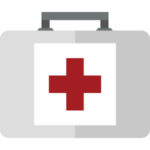
Epidemics occur when infectious disease becomes widespread in a community. An example is the 2003 Severe Acute Respiratory Syndrome (SARS) epidemic or the ongoing COVID-19 pandemic. In conjunction with our campus partners, School of Medicine personnel are continually monitoring potential biological threats that could impact our faculty, staff and students.
Influenza (flu) is a potentially serious illness that affects the Washington University community every year. It is a contagious respiratory illness that typically cycles annually, with a peak in January or February. Symptoms of the flu include fever, cough, sore throat, body aches and headache. A pandemic flu is a global outbreak, typically of new flu strands, which can spread rapidly, causing overloaded healthcare systems, inadequate medical supplies and a disrupted economy. Such outbreaks can have significant impacts on WashU operations.
How to prepare before it happens
At Home
- Keep at least 2 weeks of food and water on hand. Supplies may run low at stores.
- Maintain copies of health records from doctors, hospitals, pharmacies and other sources, for personal reference.
On Campus
- Plan for the impact on your department and employees, including extensive absenteeism.
- Establish policies to be implemented, such as flexible worksite/work hours, preventing the spread of disease, restricted travel, etc.
- Ensure adequate resources are available, such as hand-hygiene products, information technology infrastructure, etc.
What to do when it happens
- Stay home if you are sick.
- Practice good hygiene:
- Wash your hands frequently with soap and water
- Avoid touching your nose, mouth and eyes
- Cover coughs and sneezes with a tissue, or cough and sneeze into your upper sleeve
- Keep frequently touched common surfaces clean
- Try not to use other workers’ phones, desks, offices, or other work equipment
- Minimize group meetings and large events
What to do right after it happens
- Ensure a thorough cleaning of all work spaces, including equipment and common surface areas.